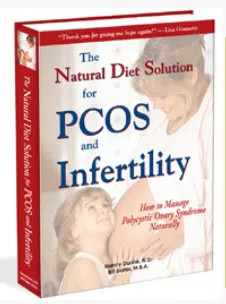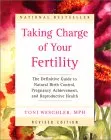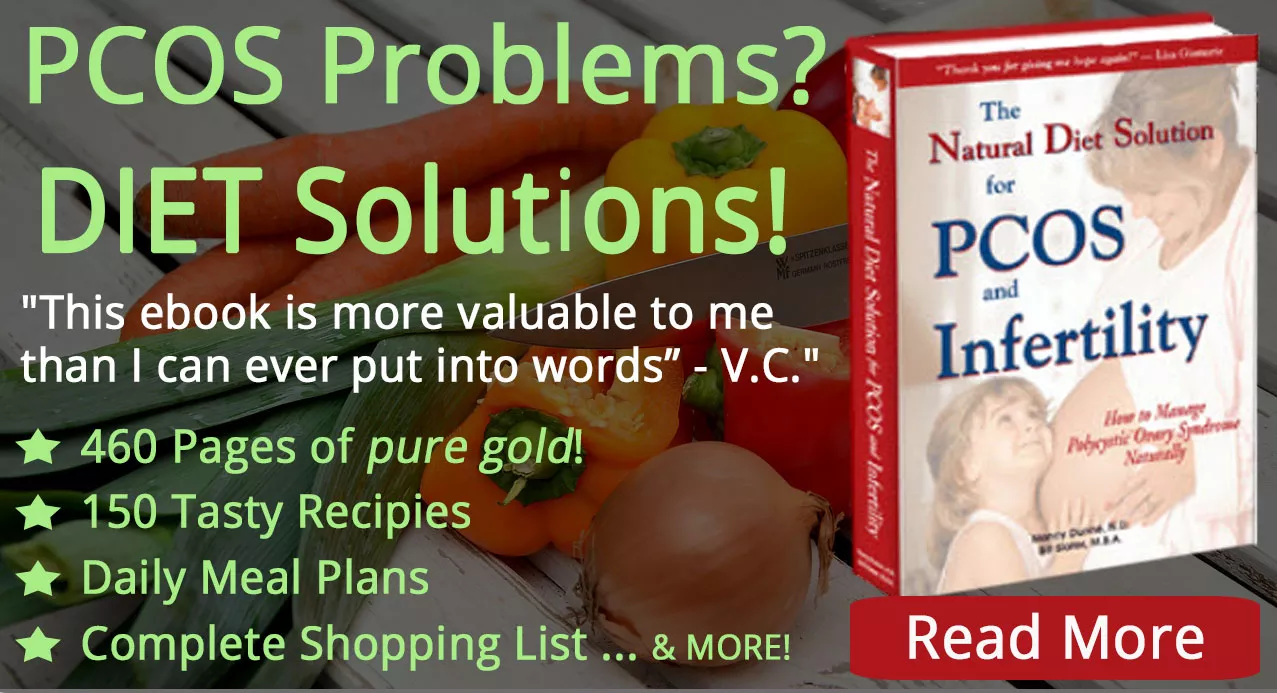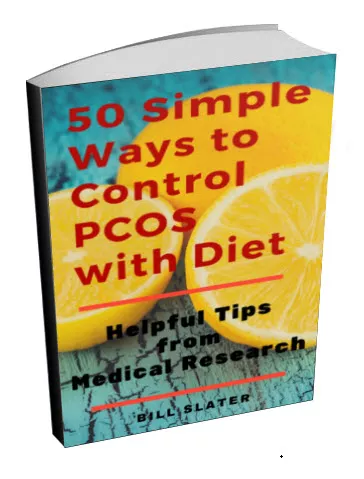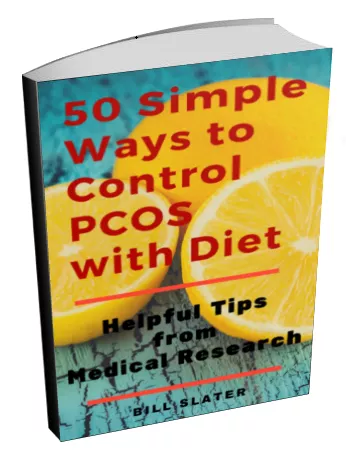18 Ways to Help Yourself Get Pregnant in Spite of PCOS
Here are 18 ways to lose weight, become pregnant, reduce unwanted hair growth, minimize hair loss and acne, and lift your mood all at the same time.
Equally important, you will also minimize your risk of developing cardiovascular disease and diabetes.
The #1 medical treatment for polycystic ovary syndrome is birth control pills. Aside from the possible side effects, there is no pill or drug that will stop or cure this disease. And as long as you take the Pill, you won't become pregnant.
Free PCOS Newsletter
Unfortunately, this disease is not a temporary problem. Because of its genetic roots, you may be prone to PCOS for the rest of your life. Therefore, you could end up taking drugs for the rest of your life. If you don't want to do that, what else can you do?
To truly come to grips with this disorder, here are some vitally important tips to help you.
Tip #1: Eat a Healthy Diet.
In general, consume the healthiest diet you possibly can. A healthy diet means eating foods that are whole, fresh, and organic. Minimize consumption of refined, processed or fabricated foods. Minimize fast foods. Eat foods with a lower glycemic index. Emphasize vegetables, fruits, nuts, seeds and legumes. Preferred animal proteins are fish and poultry. What you eat has a profound effect on the hormones that govern your fertility.
Tip #2: Improve Your Carbs
Avoid refined carbohydrates such as white bread, white rice, pastries, candy, breakfast foods, bagels, and other refined grain products. These are "bad carbs" that create insulin resistance. Insulin resistance is thought to be a primary cause of polycystic ovary syndrome.
Refined, manufactured foods in general tend to cause you to gain weight, especially around your middle.
Better carb choices are fresh vegetables, fresh fruit, and some whole legumes.
Tip #3: Maintain Adequate High Quality Protein
Many PCOS women consume too much refined carbohydrate and often not enough protein. High-quality protein helps you to keep your hormones normalized. The best protein sources are fish, organic poultry, organic eggs, wild game and lean organic meat. Other minor sources are nuts and seeds, legumes, and some vegetables.
Tip #4: Change Your Fats
Some fats and oils make your PCOS symptoms worse while others improve them. In excess, supermarket vegetables oils such as corn oil or man-made fats such as "trans-fats" can cause cells to not function properly. Saturated fats found in fatty meats and some dairy products are also undesirable.
Better choices include extra virgin olive oil, flax seeds, cod liver oil, coconut oil, and fish oil.
Tip #5: Eat More Veggies
By far, the most important things you can do is to eat more whole vegetables. Try to have at least five vegetable servings a day. Eating a significant quantity and variety of fresh, whole vegetables is a cornerstone of self-help therapy for the many health problems associated with polycystic ovary syndrome.
Tip #6: Control Your Meal Portions
Americans consume excessively large meal portions. The more you are served, the more you will eat. Trim the size of your meal servings. Eat slowly and enjoy a meal. Wait for 20 minutes. If you are still hungry, then you can go back for another portion.
Tip #7: Have Salad or Soup at the Beginning of Some Meals
Medical studies have proven that eating a big salad at the beginning of the meal will result in fewer total calories eaten at the meal. Soup is another excellent food to help you feel full without consuming too many calories. Having soup or salad with a meal will cause you to eat fewer calories and improve your ability to lose weight.
And don't forget, fewer calories will help you lose weight and improve your fertility.
Tip #8: Exercise Daily
Exercise helps you to lose weight and balance your insulin and testosterone levels, thus improving your odds of ovulating and getting pregnant. This is especially true if you have PCOS.
We often feel that we're too busy or rushed to exercise. However, not exercising is a luxury you cannot afford. PCOS women in particular must exercise more than the average person. Regular exercise has been shown to improve polycystic ovary syndrome and improve fertility.
As a minimum, try to walk or do other exercise for at least 30 minutes a day. More is better. Try a variety of exercise. For example, you might alternate aerobic exercise with weight lifting.
Tip #9: Control Stress
Chronic stress from any source -- your job, your spouse, your family, your finances -- disturbs your hormone balance, and causes you to gain weight around your midsection. Do what you can to improve any situation that is continually stressful for you. You can also work on changing your attitude towards a situation you perceive as stressful. In addition, be sure to take time for relaxation and restful sleep.
Chronic stress increases cortisol, which is a stress-response hormone. Elevated cortisol is associated with insulin resistance and increased abdominal fat. Weight loss improves your fertility. Even if you lose as little as 5%-10% of your fat weight, you greatly increase your chances of becoming pregnant. In contrast, weight gain due to cortisol reduces your fertility.
Tip #10: Use Nutritional Supplements.
Food surveys conducted by the U.S. Dept. of Agriculture and other agencies consistently show that Americans consume a diet that is deficient in essential nutrients. Therefore, nutritional supplementation is indicated. Supplementation should contribute to your overall health, help you to balance your hormones, and to have a healthier baby if you become pregnant.
Tip #11: Use Herbal Medicines.
Herbal medicines have been used for centuries to enhance fertility. For example, chasteberry (vitex) has been used to normalize menstrual cycles and improve fertility. A high quality vitex is available here.
Herbal medicines are a mystery to most people. We suggest you consult with a licensed naturopathic physician or other certified health practitioner who is trained in herbal medicine.
Tip #12: Join or Form a PCOS Support Group
Isolation is not helpful. Find other women who are going through the same thing you are and communicate frequently to give each other support and encouragement.
Tip #13: Get a Vitamin D Test
You need an optimal level of vitamin D in order to control polycystic ovarian syndrome symptoms and infertility. Get a test from your doctor. If your test value is below the mid-range of normal, you may benefit by taking supplemental vitamin D3.
Tip #14: Educate Yourself about How to Optimize Conception.
You're more likely to become pregnant if you know exactly when you are ovulating and when you should have intercourse. Your best resource in this area is "Taking Charge of Your Fertility" by Toni Weschler.
Tip #15: Clean Up Your Environment.
Do what you can to remove toxic materials from your personal and work environment. Environmental pollution and workplace exposure to chemicals adversely affects your fertility and your health. For more details on this topic, read "Our Stolen Future" by Theo Colborn, PhD. For details on how to improve your personal environment, read "Home Safe Home" by Debra Dadd.
Tip #16: Clean Up Your Insides.
Consider a physician-supervised cleansing diet or other procedures designed to remove any accumulated toxic material from your body. Naturopathic physicians specialize in safe, effective detoxification protocols.
You've probably been exposed to all sorts of petrochemicals, heavy metals and other contaminants over your lifetime. Some of these substances can reside in your body for a long time, and some act as hormone mimics or disrupters. Most of the chemicals you've been exposed to have not been evaluated for their effect on fertility. It's probable that some of them may be impairing your fertility.
Other accumulated but undesirable materials may include pathogenic microorganisms, inflammatory food particles, or various byproducts of normal metabolism.
To further explore the issue of removing toxic substances from your body, consult with a licensed naturopath or other qualified health professional.
Tip #17: Consult with a Knowledgeable Health Professional
PCOS is a complex disease that is difficult to treat, including when you are trying to become pregnant.
Find a qualified, experienced physician to work with. You will need to be thoroughly evaluated to determine the probable causes of your infertility, and what can be done about it.
This doctor should do a complete medical history, physical examinations as indicated, and laboratory testing as indicated by your health status, physical findings, and medical history.
You will need an accurate and complete diagnosis so that you can, in partnership with your physician, outline the best plan of action to help you get pregnant.
In conclusion, remember that eating the wrong foods -- and living a sedentary and stress-filled life -- will delay or prevent your return to good health. If you follow these 17 tips, you'll be amazed at how much control you have over PCOS and infertility, and you may be pleasantly surprised with a pregnancy.
The Natural Diet Solution for PCOS and Infertility provides a detailed action plan to reduce excess weight, unwanted hair growth, hair loss, acne and other troubling PCOS symptoms -- and improve your fertility.
Tip #18: Try Prayer
If you have polycystic ovarian syndrome, are trying to get pregnant, and you also believe in a spiritual life, this study may interest you.
219 South Korean women (age 26-46) undergoing in-vitro fertilization-embryo transfer were randomly assigned to one of two groups: One group received intercessory prayer; the other group did not. The intercessory prayers were carried out by groups in the U.S., Canada, and Australia. Those receiving prayers experienced a pregnancy rate of 50% vs. 26% in the no-prayer control group. These results were independent of any other clinical variables.
Regardless of whether you believe in prayer, this research demonstrates that you can benefit from outside support, in whatever form it may take. Whether your goal is to become pregnant, lose weight, stay on a healthy diet, or be consistent with your exercise, support from other people will help you to get where you want to go. Or possibly you're experiencing emotional pain because of PCOS. It's important to find others who can understand how you feel.
This is why we recommend that you join a support group in your area. We also recommend that you involve your friends and loved ones in helping you to deal with PCOS problems.
Source: Does prayer influence the success of in vitro fertilization-embryo transfer?, Cha, KY et al, J Reprod Med, 2001; 46(9):781-7
If you follow through on these tips, you'll increased your chances of becoming pregnant, as well as a successful pregnancy without complications.
Return to: What Is Infertility Page
Get Answers to your Questions about
- Fertility
- Weight Control
- Hair Loss
- Stress
- Unwanted Hair
- Acne...and more!
FREE PCOS Report
and Newsletter

Your email is safe with us. We respect your privacy, and you may unsubscribe at any time.
Recent Articles
-
PCOS Long Journey to The Happy End
Apr 30, 18 07:24 PM
Hi Girls, Maybe my story will have one day a good end but I am not there yet. Until I was 31 years old I lived my dream, having lovely husband, good -
PCOS and Miscarriage
Apr 17, 18 04:03 PM
Proper diet and natural supplements can help the body maintain a pregnancy through successful delivery.
-
How to Deal with PCOS and Stress
Apr 04, 18 04:19 PM
Your body has a natural capacity to heal itself if you provide it with the necessary tools.
